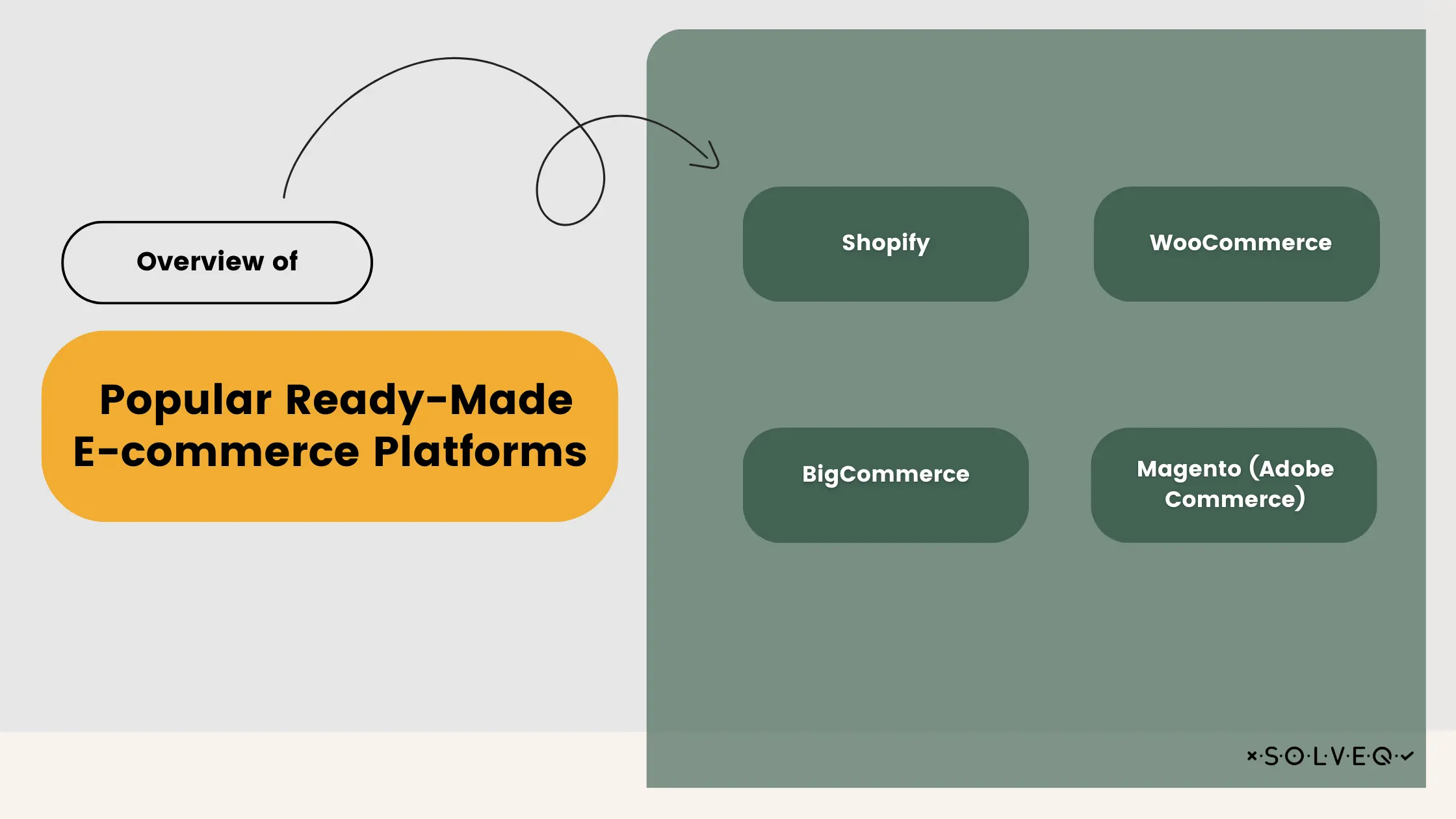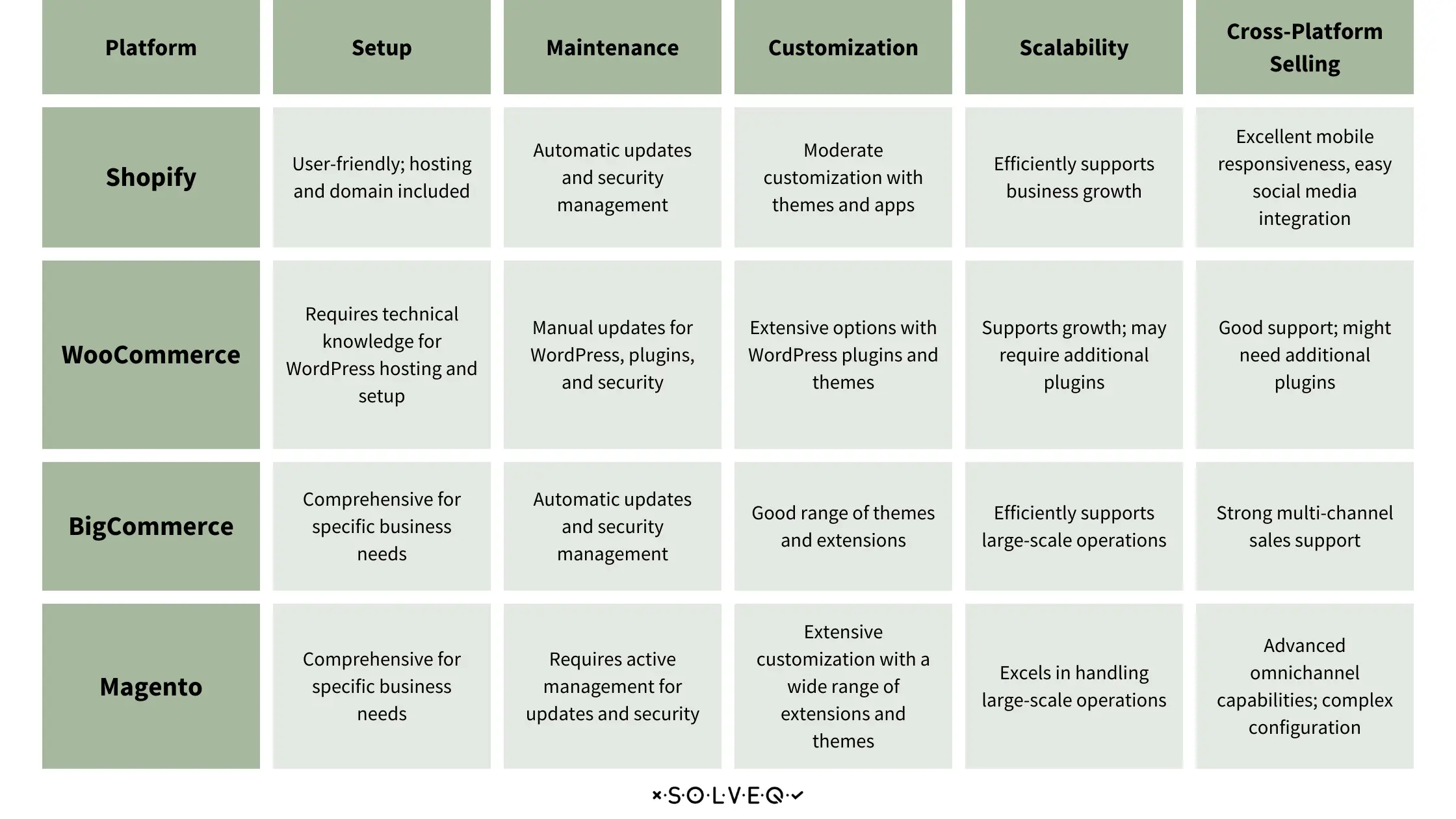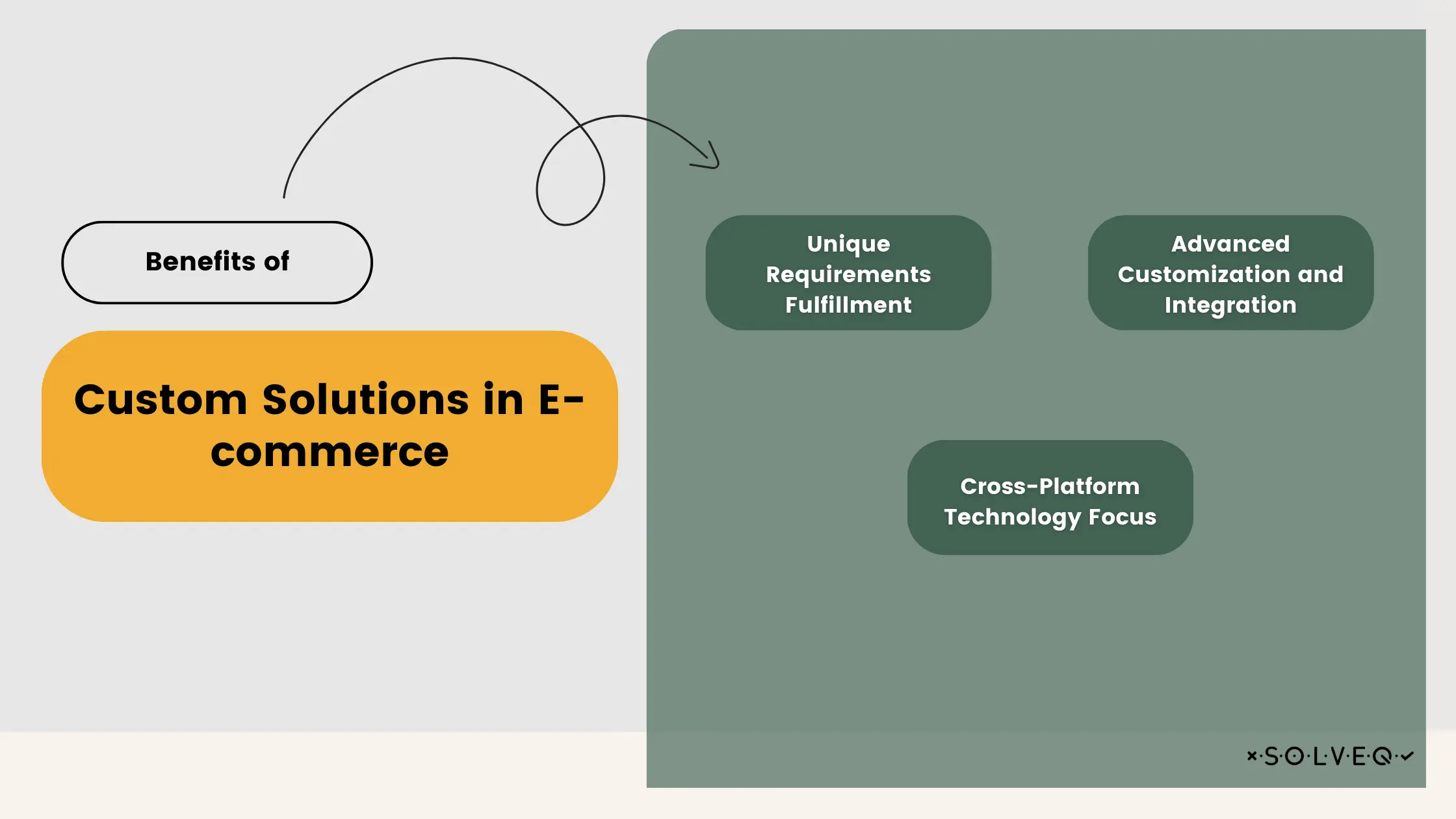Behind the Scenes: The Technical Demands of Running Your E-commerce Site
6 Feb 2024 • 14 min read

Marcin Kulawik

In the dynamic world of online retail, selecting the right e-commerce platform is crucial for success. This choice presents businesses with a myriad of technical demands and strategic decisions. Our focus here is to compare leading ready-made e-commerce platforms – each with its unique strengths and limitations. Additionally, we delve into the reasons for considering custom solutions, especially for those seeking advanced capabilities and flexibility. Central to our exploration is the impact of cross-platform technology, a key factor in today's digital marketplace.
Overview of Popular Ready-Made E-commerce Platforms
As we delve into the world of e-commerce, it becomes evident that the choice of platform can significantly influence the success and functionality of an online store. Among the plethora of available options, certain platforms have emerged as popular choices, each bringing its unique set of features and benefits to the table.

Shopify
Stands out for its exceptional user-friendliness. Designed with the non-technical user in mind, it offers a straightforward interface that simplifies the complexities of online retail. Its extensive app marketplace is a treasure trove of functionalities, enabling store owners to enhance their sites with everything from SEO tools to advanced analytics. Moreover, Shopify's built-in features are comprehensive, catering to a wide array of e-commerce needs, from inventory management to payment processing, making it a versatile choice for businesses of all sizes.
WooCommerce
Takes a different approach as a WordPress plugin, offering unparalleled flexibility. This platform is a favorite among those already familiar with WordPress, as it seamlessly integrates with the existing ecosystem, transforming a website into a powerful e-commerce store. The customization possibilities are virtually endless with WooCommerce, thanks to a vast array of themes and plugins. Whether it's tweaking the aesthetic details or adding complex functionalities, WooCommerce empowers users to tailor their online store to their exact specifications.
BigCommerce
It is renowned for its scalability and comprehensive sales tools. This platform is designed to grow with your business, effortlessly handling increased traffic and sales volumes without compromising performance. BigCommerce also excels in integration capabilities, offering smooth connections with multiple marketplaces and social media platforms. This feature enables merchants to expand their reach and tap into new customer bases effortlessly.
Magento (Adobe Commerce)
Is often the go-to for large enterprises due to its robustness and scalability. This platform can handle the complex needs of major online retailers, offering a sturdy foundation that supports substantial product catalogs and high traffic volumes. The customization options with Magento are extensive, with a wide range of extensions and themes available. This flexibility allows businesses to craft a highly tailored e-commerce experience that can align perfectly with their brand identity and operational needs.
Each of these platforms offers a unique set of features and capabilities, making them popular choices for businesses embarking on their e-commerce journey. Selecting the right one depends on a variety of factors, including business size, technical expertise, and specific e-commerce requirements.
Technical Demands of Running a Ready-Made Platform
Running a ready-made e-commerce platform, while simplifying many aspects of online retail, still comes with its set of technical demands. These demands, ranging from initial setup to long-term scalability, are crucial for ensuring a smooth and successful online business operation.
Setup and Maintenance
One of the primary considerations is the ease of setup, which varies across platforms. For instance, Shopify offers a streamlined setup process with hosting and domain registration included, making it a hassle-free entry point for beginners. WooCommerce, being a WordPress plugin, requires a bit more technical know-how, especially for hosting and initial WordPress configuration. BigCommerce and Magento offer more comprehensive setup processes, catering to businesses with specific requirements. The ongoing maintenance of these platforms also differs. Shopify and BigCommerce manage updates and security patches automatically, reducing the burden on store owners. WooCommerce and Magento, however, require more active management, with regular updates needed for WordPress, plugins, themes, and security patches.
Customization and Scalability
When it comes to customization, each platform has its strengths. Shopify and BigCommerce offer a range of themes and apps/extensions for customization, but Magento and WooCommerce stand out for their extensive customization capabilities. Magento, with its wide array of extensions and themes, is ideal for businesses requiring a highly tailored e-commerce experience. WooCommerce's access to WordPress's vast plugin repository allows for almost limitless customization. In terms of scalability, all four platforms are designed to support business growth, but BigCommerce and Magento, in particular, excel in handling increased traffic and sales without compromising performance.
Cross-Platform and Omnichannel Selling
In today's digital landscape, the ability to sell across multiple platforms and channels is crucial. Shopify shines in this area with its excellent mobile responsiveness and easy integration with social media and various marketplaces. WooCommerce also supports omnichannel selling, though it may require additional plugins for seamless integration. BigCommerce's strong suit is its native support for multi-channel sales, making it a robust choice for a diversified sales strategy. Magento offers advanced omnichannel capabilities, but these often require more complex configurations and are more suited for enterprises with specific omnichannel requirements.

Each platform brings different strengths to these technical aspects. The choice of platform should align with the business’s technical capacity, growth aspirations, and the desired level of control over the e-commerce environment. Whether it’s a turnkey solution like Shopify or a customizable framework like Magento, understanding these technical demands is key to leveraging the full potential of any e-commerce platform.
The Case for Custom Solutions in E-commerce
While ready-made e-commerce platforms offer ease and convenience, custom solutions present a compelling case, especially for businesses with unique requirements or those seeking advanced technological capabilities.
Unique Requirements Fulfillment
Custom e-commerce solutions shine in their ability to meet specific business needs that off-the-shelf platforms might not address. For businesses with unique product offerings, unconventional business models, or the desire to provide a distinct customer experience, custom solutions offer the flexibility to tailor every aspect of the e-commerce process. This approach allows for the creation of a platform that not only aligns perfectly with the business’s operational processes but also resonates uniquely with its brand identity and customer expectations.
Advanced Customization and Integration
One of the most significant advantages of custom e-commerce solutions is the level of customization and integration they offer. Unlike ready-made platforms, which may have limitations in terms of design and functionality, custom solutions can be built from the ground up to create a fully personalized shopping experience. This includes bespoke design elements, unique user interface and user experience (UI/UX) designs, and custom-developed features. Furthermore, custom solutions can be seamlessly integrated with existing systems, databases, and third-party services, ensuring smooth operation and data synchronization across all business functions.

Cross-Platform Technology Focus
Custom e-commerce solutions also excel in leveraging cross-platform technologies. Utilizing frameworks like React Native for mobile apps or progressive web apps (PWAs), businesses can ensure a consistent and engaging user experience across all devices and platforms. This approach not only enhances the customer experience but also streamlines development and maintenance processes. By adopting such technologies, businesses can provide a unified shopping experience, whether the customer is on a desktop browser, a mobile app, or a tablet. This level of integration and consistency is particularly beneficial in today’s market, where customers expect seamless interactions across multiple touchpoints.
In conclusion, while ready-made e-commerce platforms provide a quick and easy solution for many businesses, custom solutions offer unmatched flexibility and potential for businesses with specific needs or those aiming for a high level of brand differentiation. By addressing unique requirements, offering advanced customization and integration, and leveraging modern cross-platform technologies, custom e-commerce solutions can provide a competitive edge in the digital marketplace.
Why Choose a Custom Solution: Emphasizing Cross-Platform Technology
In an age where the digital experience is paramount, choosing a custom solution that leverages cross-platform technology can be a game-changer for businesses seeking to maximize their e-commerce potential.
Seamless User Experience Across All Devices
The cornerstone of a successful online retail presence is the ability to provide a consistent and seamless user experience across all devices. In a world where customers switch effortlessly between smartphones, tablets, and desktops, the importance of a unified shopping experience cannot be overstated. Custom solutions, designed with cross-platform technologies, ensure that every interaction with the brand feels familiar and intuitive, regardless of the device or platform being used. This consistency not only enhances user satisfaction but also reinforces brand identity and trust.
Flexibility and Scalability
Custom solutions built with cross-platform technologies inherently offer greater flexibility and scalability. They are designed to evolve alongside emerging technology trends, ensuring that the e-commerce platform remains cutting-edge and relevant. This adaptability is crucial in an ever-changing digital landscape, where staying ahead of technological advancements can significantly impact business success. Additionally, these custom solutions can easily scale to accommodate business growth, handle increased traffic, and expand to new markets or platforms without the need for complete redevelopment.
Long-Term Cost Efficiency and Competitive Advantage
While custom solutions may entail a higher initial investment compared to off-the-shelf platforms, they offer superior long-term cost efficiency. The ability to precisely tailor functionalities to specific business needs means that resources are not wasted on unnecessary features. Moreover, the scalability and flexibility of custom solutions reduce the need for frequent major overhauls, lowering the total cost of ownership over time. Beyond cost, a custom solution provides a competitive advantage. A unique and tailored customer experience, aligned with the brand’s values and customer expectations, sets a business apart in a crowded digital marketplace. This bespoke approach can lead to higher customer engagement, loyalty, and, ultimately, increased sales.

In summary, opting for a custom e-commerce solution focused on cross-platform technology is a strategic choice that offers numerous benefits. From providing a seamless user experience across all devices to ensuring long-term cost efficiency and gaining a competitive edge, custom solutions are a powerful tool for businesses aiming to thrive in the digital era.
Summary
Navigating the e-commerce landscape requires a strategic choice between ready-made platforms and custom solutions. Our exploration has compared popular platforms like Shopify and WooCommerce, emphasizing their unique features and suitability for various business needs. We've also highlighted the advantages of custom solutions, especially their flexibility and the benefits of cross-platform technology. This decision is pivotal for ensuring a seamless, scalable online presence tailored to specific business goals. For businesses seeking bespoke, cross-platform e-commerce solutions, our expertise in creating custom apps offers the perfect pathway to digital success.
Share:
Looking for expert development team?
Schedule a call with Tech Consultant

Marcin Kulawik
Founder and CEO of SolveQ. Huge fan of building things with purpose, agility, and having fun while changing the World. Loves his family, teammates, and nature.